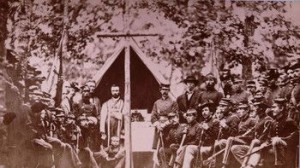 The Southern Baptist news beat goes on today in the form of editorials and commentary in the Georgia Baptist Christian Index that are intended to bolster the spirits of the Confederate faithful.
The Southern Baptist news beat goes on today in the form of editorials and commentary in the Georgia Baptist Christian Index that are intended to bolster the spirits of the Confederate faithful.
One editorial extols the unparalleled nature of the revivals in the Confederate Army.
Never before have their been such meetings, such sermons and such prayers, such convictions and such conversations, as accompany the revivals that mark the progress of this revolution, in camp, on the march, and before and after the bloodiest conflicts. We should pray for a brighter and and more glorious continuance of this revival spirit, and we should never be satisfied until it largely affects our churches at home.
Another editorial claims that God’s hand following battlefield reverses stoked the great revival fires.
There was a time when even warm-hearted christians in the South were discouraged and avowed the expediency of postponing all agency for the spiritual benefit of our churches, army and people; when chaplains became disheartened, resigned and returned home; when profanity, drunkenness, gambling and Sabbath-breaking were most glaring; when spiritual wickedness in high places, stalked abroad unblushingly. Our thoughtful readers can easily remember the time. It was a time when religion was low in the land, and when the army seemed steeped in iniquity. It was this time, when, beginning at Donelson and Roanoke Island, calamity after calamity fell upon us as so many thunderclaps of God’s judgments; and it was then that a public fast was proclaimed, and the great christian heart of the land sent up a sound of horror at the prevailing iniquities and the heartless indifference of the hour. It was a time when ordinary means for promoting a revival spirit were not in operation; when prayer was restrained, when exertion languished, and when faith was weak. To have expected a revival in camp would have been esteemed the dream of a madman….
Interest in religion began to be manifest in our camps–souls cried after spiritual nourishment–a wail for unpardoned sin went forth–and christians woke to a sense of duty. Laborers entered the field–the Testament, the tract, the camp hymn book, the religious paper were circulated–prayer meetings were held–sermons were preached–sinners were converted; and this work which was the Spirit’s work, inaugurated and maintained by him, when human effort had ceased, and human faith had almost failed, went on and spread, and has continued to this day–the wonder and admiration of our grand revolution.
Yet another editorial envisions what life will be like in the Confederacy when the war is over.
When this war shall have been brought to a successful close, and peace shall sit smiling its benignancy upon a disenthralled land, with independence spreading all over our heavens the gorgeous hues of hope and joy, we want the task to be ours of singing the honor of these noble heroes, whose sacrifices, personal bravery and indomitable perseverance accomplished the glorious result.
The effectiveness of such propaganda is far from clear. The revivals are not quite as glorious, the soldiers not as pure, and the revolution not as sure as the effusive commentators wish their readers to believe. Yet for the moment, grand language and sweeping visions keep alive the hopes of the white South.
Sources: “Thoughts and Hints for the Day,” “Tokens of God’s Favor,” and “Honor to Our Soldiers,” Christian Index, September 4, 1863


